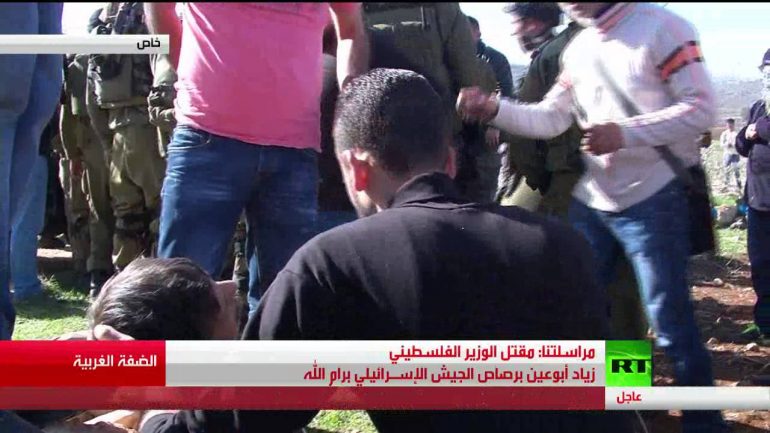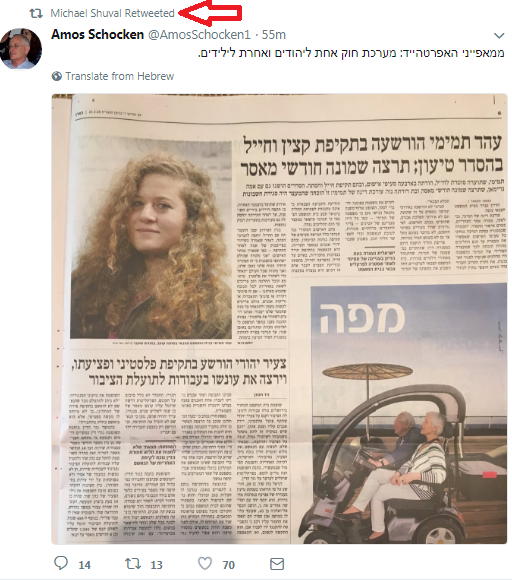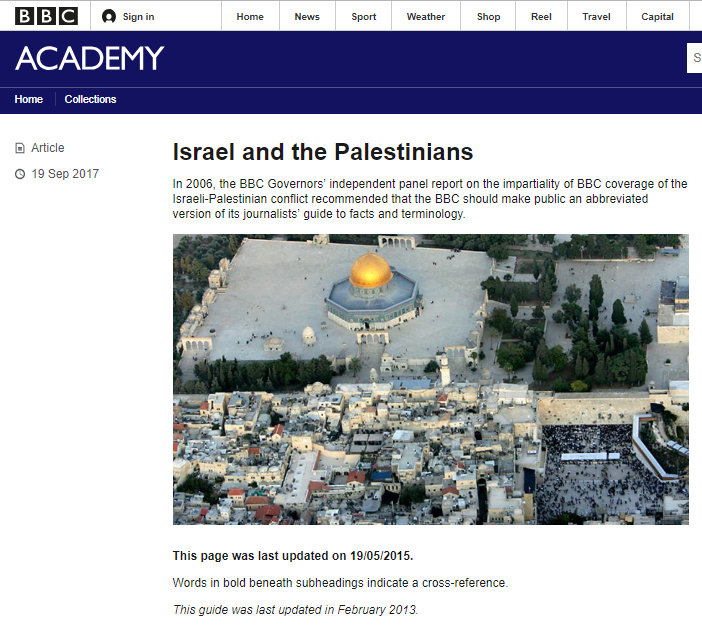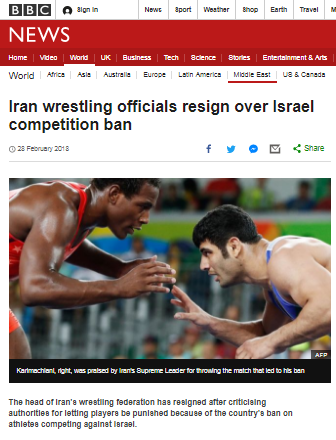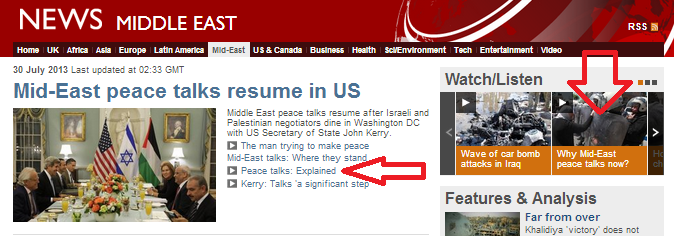On December 10th the afternoon version of the BBC World Service radio programme ‘Newshour’ – hosted by Rebecca Kesby – included an item (available here from 00:45:00) concerning the death earlier in the day of Palestinian official Ziad Abu Ein. Kesby introduces the item as follows: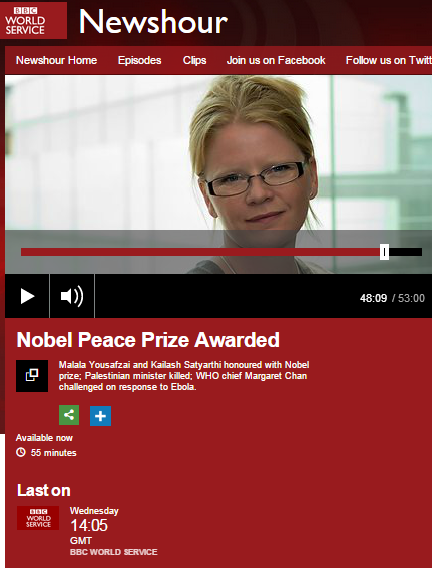
“Now, tensions have been high between Israelis and Palestinians in recent weeks over contested religious sites in Jerusalem and the dispute over defining Israel as a Jewish state. In the past few hours a…eh…a Palestinian minister of the government, Ziad Abu Zain [sic] has died after an altercation with Israeli soldiers near Ramallah. He was taking part in a protest against Israeli occupation. Well, Abdullah Abrama [sic] was one of the coordinators of that demonstration and a short time ago I asked him what happened.”
The person presented as Abdullah Abrama answers:
“Today is, you know, it’s the international human rights day and before one week we visited the village Turmus Aya, me and the minister Ziad Abu Ein, and we hear to the problem of the people. They told us about the settlers from Adei Ad outpost: they confiscated their land and they attack them every day, every night…”
Kesby: “OK…OK…so there was a protest. But there was some sort of argument, wasn’t there, between the minister and…err…Israeli forces there? What were the circumstances of him being taken ill?”
AA: “Yeah…for this today we organize a small action; a volunteer day to support the farmers, to go with them to plant olive trees in their land. We go in the morning. We found a big number of soldiers. They stop us. They don’t allow us to arrive the land – the private land for the farmers there – and they start to use the violence against us. One of the soldiers coming to the minister and they put them down by his helmet. They beat him by helmet…eh…his helmet to the head of the minister Abu Ein and in that time we have tear gas smoke and sound grenades smoke. He fall down and he start to stop his breath. We took him directly to the ambulance and to the hospital but for sorry he’s die.”
Kesby: “Just…in terms of being clear about exactly what happened, so you’re saying an Israeli soldier stepped forward and struck the minister over the head with his helmet. Is that what you’re saying?”
AA: “Exactly, yeah. They strike him by his helmet, yeah, and the minister fall down. They use the violence against of us, the people there. We have farmers, we have old men, we have women. They beat all of us and as I told they don’t make any consideration for the minister or for the old men.”
Kesby: “So when the minister fell to the ground, I mean, was he still alive at that point? Or was there any indication that maybe he had a heart attack or there could be some other problem he was suffering?”
AA: “When he fell down he is in a coma. We saw him in a coma and we took him directly to the ambulance and to the hospital because he’s stop talking and, ya’ani, as I say is in a coma.”
So who is the person introduced by Rebecca Kesby as “Abdullah Abrama”? There appears to be no such person but an internet search for ‘Ziad Abu Ein’ and ‘helmet’ shows that the same story of the Palestinian official being hit on the head with a helmet by an Israeli soldier was also being heavily promoted elsewhere at the same time by veteran anti-Israel activist and leading figure in the Bil’in Popular Committees Abdallah Abu Rahma (also spelt Rahmah or Rahmeh).
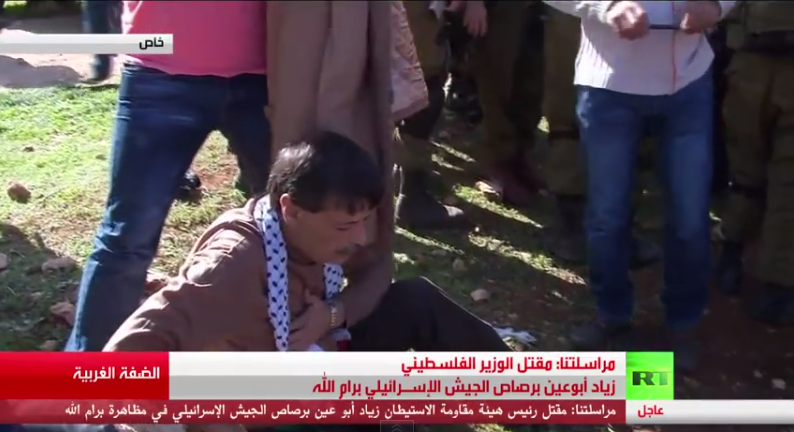
Obviously Abrama/Abu Rahma’s account of events is for the most part fictitious. There is no evidence in any of the filmed footage taken at the event of Abu Ein having been deliberately hit on the head with a helmet and videos also show that he clearly did not immediately ‘fall down’ – either “in a coma” or otherwise. As has already been noted here, in between the altercation with a Border Police officer and his sitting down, Abu Ein managed to give an interview to the media and it is of course highly doubtful that he did that whilst “in a coma”. Neither is there any filmed evidence to support Abrama/Abu Rahma’s claim that “all” the participants in the demonstration were beaten.
Abrama/Abu Rahma also misleads BBC audiences with regard to the circumstances of the demonstration which was in fact organized to coincide with the presentation of a petition to the Supreme Court demanding the eviction of the Adei Ad outpost.
So as we see, the corporation ostensibly committed to standards of accuracy and impartiality and claiming to be the ‘standard setter’ for international journalism has allowed its radio audiences worldwide to be completely misled by the unchallenged propaganda of a known political activist who is not even properly identified. If that were not bad enough, anyone else listening to that programme during the coming year in which it will be available on the internet or hearing it as a podcast will also be misled. Furthermore, this inaccurate and defamatory information broadcast by the supposedly reliable BBC has already been picked up and amplified by other media outlets, as this example from Radio New Zealand shows.
Obviously a media organization truly committed to the editorial standards claimed by the BBC would take steps to ensure that this grossly inaccurate item was quickly signposted as such in order to avoid misleading any more members of the public.
Related Articles:
Multiple inaccuracies in Kevin Connolly’s filmed BBC report on death of Ziad Abu Ein
BBC’s Knell at Abu Ein funeral: all the rumour not worth reporting
BBC News website’s written reports on Abu Ein continue to spread rumour
BBC showcases convicted anti-Israel activist in context-free illustration

